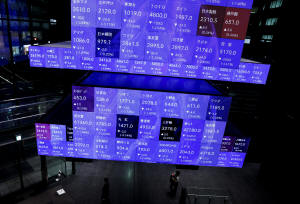Falling stocks and bruised dollar reel from BOJ's surprise policy shift
 Send a link to a friend
Send a link to a friend
 [December 20, 2022] By
Nell Mackenzie [December 20, 2022] By
Nell Mackenzie
LONDON (Reuters) -World stocks slid on Tuesday after a policy tweak by
Japan's central bank rattled investors already worried about the
economic fallout of rising interest rates and untameable inflation.
The Bank of Japan (BOJ) widened the allowable band for long-term yields
to 50 basis points either side of its 0% target, from 25 basis points
previously.
The policy decision caused an immediate spike in the yen, with the
dollar index dropping 0.80% to 103.95, a six-month low. US stock futures
traded down and slightly flat under 0.25%.
European stock markets hit six-week lows, with the German and French
benchmark indices falling by as much as 1%, while London's FTSE 100 lost
as much as 0.8%.
Japanese 10-year government bond yields surged to their highest level
since 2014, with euro zone yields following suit. Yields rise when bond
prices fall.
Investors have needed time to digest the series of rate hikes delivered
last week from central banks including the Bank of England, the European
Central Bank and in particular, the U.S. Federal Reserve, said Tatjana
Puhan, the deputy chief investment officer at TOBAM, a Paris-based asset
management firm.

"Markets didn't want to believe it, but this move by the BOJ emphasises
that central banks remain concerned that inflation will stay higher,"
Puhan said.
The BOJ has steadily bought billions of dollars' worth of government
bonds to keep long-term interest rates low, despite a pickup in
inflation, both at home and abroad.
"Think of the scenario where we go into a recession and inflation
remains higher," Puhan said. Unsure whether Tuesday's market moves would
have a snowball effect or they were just a temporary shock, over the
long term investors should prepare for more downside, she said.
[to top of second column] |

Visitors walk past Japan's Nikkei stock
prices quotation board inside a conference hall in Tokyo, Japan
September 14, 2022. REUTERS/Issei Kato

Rising COVID cases that threatened to slow China's reopening to the
rest of the world from nearly three years of lockdowns was also a
point of focus for investors, Puhan said, as further lockdowns that
might compromise China's growth would have a lasting effect on the
world economy.
"So many US companies produce in China and rely on its supply chain.
This can't be changed overnight," Puhan said.
However, James Rossiter, head of global macro strategy at TD
Securities, said that thin liquidity in today's markets should be
taken into account.
"There has got to be a lot of people on holiday saying, 'Wait, this
wasn't supposed to happen'," he said.
Rossiter pointed to BOJ Governor Haruhiko Kuroda's speech in which
he said the policy tweak was "aimed at improving market functions"
and was "not an interest rate hike."
This knocked other currencies from recent gains, with both the euro
and pound falling more than 3.5% against the yen.
In turn, the Nikkei benchmark index slumped 2.71% after trading in
positive territory earlier in the day, while U.S. stock futures fell
between 0.1% and 0.2%, suggesting a modestly weaker start to
trading.
In the oil market, Brent crude rose 0.20% to $79.95 per barrel,
while U.S. crude rose 1.3% to $76.19.
Spot gold benefited from the weakness in the dollar, rising 1% to
around $1,805 per ounce. [GOL/]
(Reporting by Nell Mackenzie in London; Additional reporting by
Scott Murdoch in Sydney; Editing by Lincoln Feast, Edwina Gibbs,
Arun Koyyur and Mark Porter)
[© 2022 Thomson Reuters. All rights
reserved.]
This material may not be published,
broadcast, rewritten or redistributed.
Thompson Reuters is solely responsible for this content. |